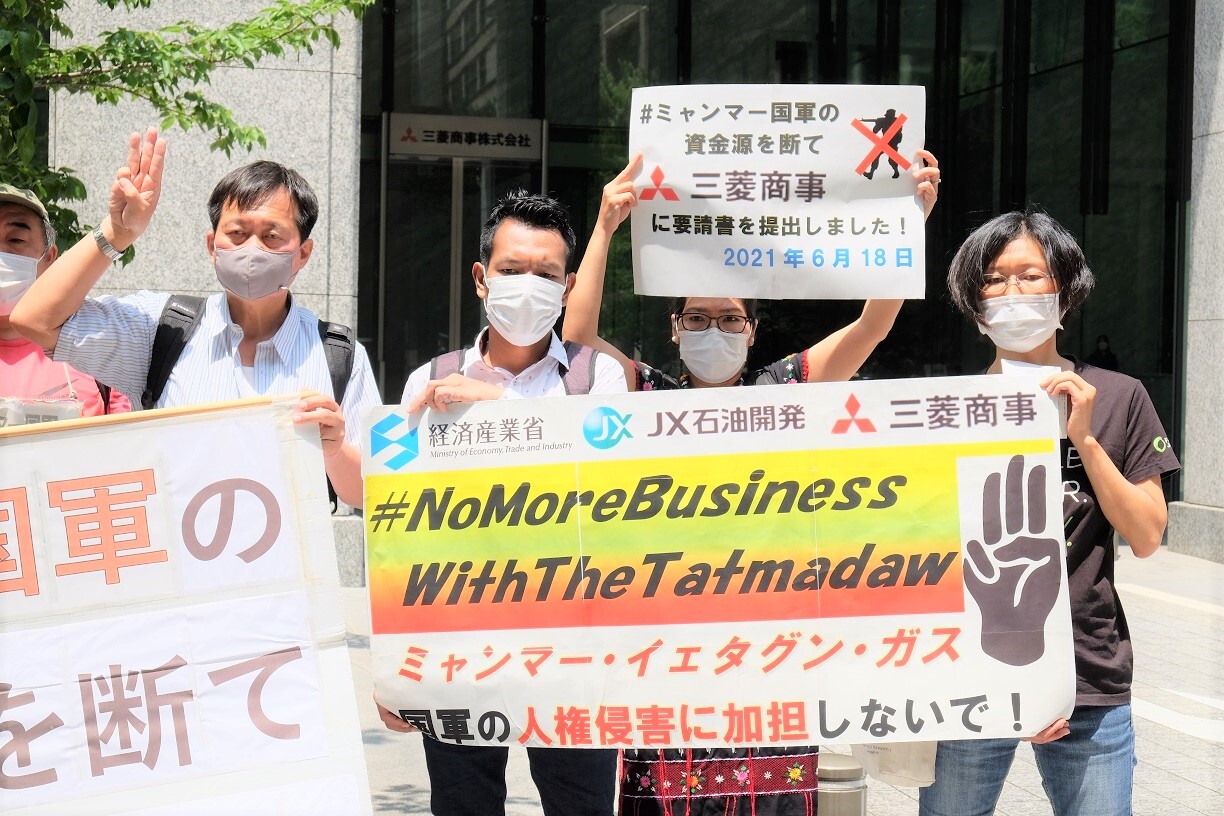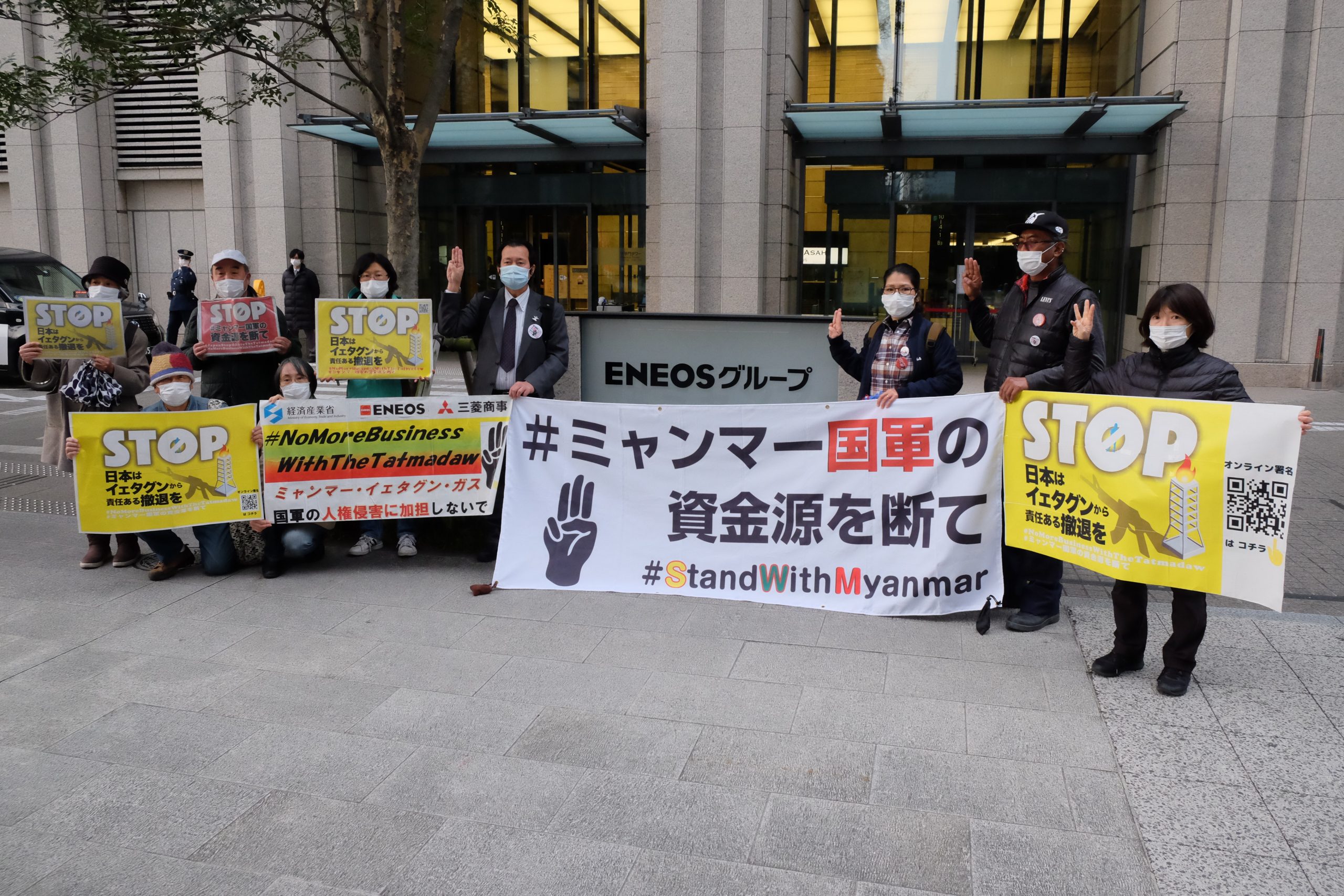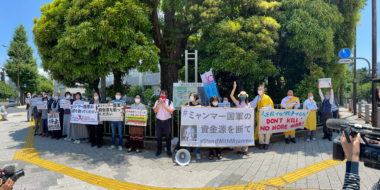[Press Release] 13 Institutional Investors Respond to Call for Engagement. Concern Expressed Over Japanese Companies Continuing Business in Myanmar
> PDF version is available here
Mekong Watch
Friends of the Earth Japan
Justice For Myanmar
ayus:Network of Buddhists Volunteers on International Cooperation
Japan International Volunteer Center (JVC)
Network Against Japan Arms Trade (NAJAT)

On January 18, 2022, we sent a letter to 125 major institutional investors holding shares in four Japanese companies that continue to finance four problematic projects in Myanmar. The four Japanese companies are ENEOS Corporation, Sumitomo Corporation, Marubeni Corporation, and Mitsubishi Corporation. Because the four projects may be financially linked to the Myanmar military, the letter asked the investors to engage with the four companies to ensure that the companies do not provide any revenue to the Myanmar military, which would finance its international crimes and grave violations of human rights, including murder, persecution, arbitrary detention, sexual violence, forced disappearance, and torture.
Following this letter, to date we have received substantive responses from 13 investors, three of which stated that they engaged with one or more of the four companies after receiving our letter. Further, two other investors stated that they were already engaging with companies that were not included in our letter but regarding Myanmar.
Some European investors actively asked for further information and our view in order to engage with the companies. On the other hand, Japanese investors, with one exception, sent us feedback that did not correspond to our request, such as an explanation of the investor’s human rights policy. They also did not disclose details about their engagement with the companies, including whether they were engaging at all.
The four companies are involved in four projects in Myanmar: Thilawa Special Economic Zone (SEZ) development, Yetagun gas project, Landmark Project (Yoma Central Project), and Thilawa Area Port Terminal Operation Project.
Regarding the Yetagun gas project, Mitsubishi Corporation and ENEOS indicated through media reports after we sent our letter to investors that they are planning to withdraw from the project. However, we will continue to demand that the two companies take every measure to disengage from the project in a way that ensures that funds will not flow to the Myanmar military, and that they take responsibility for the decommissioning of the gas field, which is expected to be depleted in the near future.
The Thilawa SEZ Management Committee has a 10% stake in the Thilawa SEZ Development Project, and there is a possibility that a part of the dividend payments may flow to the Myanmar military. After the attempted coup, the military arrested and detained the chairperson of the Thilawa SEZ Management Committee and appointed a new chairperson. There are concerns that military involvement in the entire project may increase. The Japanese government has explained that the dividend payments are not being made for now and that the funds are being reinvested in the project, but it is unclear how long this measure can be taken.
The land for the Landmark Project (Yoma Central Project) is subleased from the state-run Myanma Railways. Although construction has been suspended, the military is in effective control of the Ministry of Rail Transportation which controls Myanma Railways, and there are concerns whether it is possible to ensure that the land lease payments do not flow to the Myanmar military.
Regarding the Thilawa Area Port Terminal Operation Project, because the military effectively controls relevant government ministries, it is not possible to reliably prevent payments under the concession contract with the Myanma Port Authority (MPA), such as usage fees, from flowing to the military.
In Myanmar, violence and human rights violations by the Myanmar military show no sign of stopping, and the number of victims of the military’s campaign of terror is increasing by the day. We call on investors to further engage with the four Japanese companies, and if the investee companies do not take steps to prevent the flow of revenue to the Myanmar military, to consider divestment.
The letter contained the below table.
Table: Possible flow of funds to Myanmar’s military via each project and steps requested of each company
*See the PDF version for footnotes.
| Project name and financers (percentage of total funding) | Possible flow of funds to military | Steps requested of each company |
| Thilawa Special Economic Zone (SEZ)Development Project1 ・Japanese private companies (39%) ・Sumitomo Corporation (32.2%) ・Marubeni Corporation (32.2%) ・Mitsubishi Corporation (32.2%) ・Mizuho Bank (1.13%) ・Sumitomo Mitsui Banking Corporation (1.13%) ・MUFG Bank (1.13%) ・Japan International Cooperation Agency (JICA) (10%) ・Myanmar Thilawa SEZ Holdings (41%) ・Thilawa SEZ Management Committee (10%) | Possibility of partial flow of dividends to the military, due to 10% joint funding by the Thilawa SEZ Management Committee The military has already taken control of Thilawa SEZ Management Committee personnel (the chairman was arrested and detained after the coup d’état, and a new chairman was subsequently appointed by the military), and military involvement in the entire project may increase | Suspension of dividend payments Elimination of influence from the military on decision-making about SEZ operations Withdrawal from project if benefiting the military cannot be avoided |
| Yetagun Gas Project2 ・Petronas Carigali (40.9%) ・Myanma Oil and Gas Enterprise (MOGE) (20.5%) ・PTT Exploration and Production (PTTEP) (19.3%) ・Nippon Oil Exploration (19.3%) ・JX Nippon Oil & Gas Exploration Corporation (which is 100% subsidiary of ENEOS) (40%) ・Mitsubishi Corporation (10%) ・Minister of Economy, Trade and Industry, Japan (50%) | The military is already in effective control of relevant government ministries, Central Bank, and the Myanma Oil and Gas Enterprise (MOGE), and it is not possible to reliably prevent revenue payments, including profits from MOGE’s investment in natural gas fields and transmission pipelines, from being used by the Myanmar military It is not possible to reliably prevent payments levied on natural gas production and transmission based on production sharing agreements, etc.from flowing to the military | Suspend all payments to military-controlled entities, holding them in a protected account until democracy is established. Withdrawal from project if benefiting the military cannot be avoided |
| Landmark Project (Yoma Central Project)3 ・Special Purpose Company formed by Japanese participants ・Mitsubishi Corporation ・Mitsubishi Estate ・Japan Overseas Infrastructure Investment Corporation for Transport & Urban Development (JOIN) ・Serge Pun & Associates’ SPA Group ・Asia Development Bank (ADB) ・International Finance Corporation (IFC) | Because the military is already in effective control of relevant government ministries, and land for the project is sub-leased from Myanma Railways under the Ministry of Rail Transportation4, it is not possible to reliably prevent these land lease payments from flowing to the military | Investigation of whether land lease payments and other project returns benefit the military, and withdrawal if benefiting the military cannot be avoided |
| Thilawa Area Port Terminal Operation Project5 ・Special Purpose Company formed by Japanese participants (35%) ・Sumitomo Corporation (36%) ・Toyota Tsusho Corporation (34%) ・Japan Overseas Infrastructure Investment Corporation for Transport & Urban Development (JOIN) (30%) ・Kamigumi (51%) ・EFR Group (14%) | Because the military is already in effective control of relevant government ministries, it is not possible to reliably prevent payments under the concession contract with the Myanma Port Authority (MPA) such as usage fees from flowing to the military | Suspend all payments to military-controlled entities, holding them in a protected account until democracy is established, since the military has placed MPA under effective control by the regimeWithdrawal from project if benefiting the military cannot be avoided |
Contact:
Mekong Watch
3F Aoki Bldg., Taito 1-12-11,
Taito-ku, Tokyo 110-0016, Japan
Phone: +81-3-3832-5034
E-mail: contact(@)mekongwatch.org

![[Press Release] Letter Sent to 125 Investors to Urge Japanese Companies Continuing Business in Myanmar to Stop Funding the Military](/img/wp/thum_foejapan.png)
